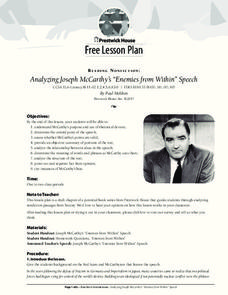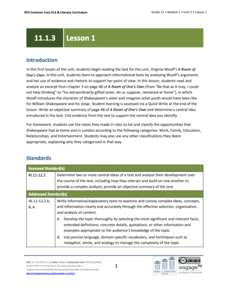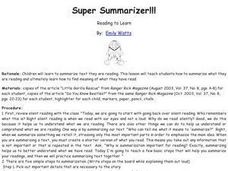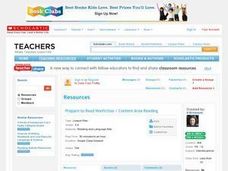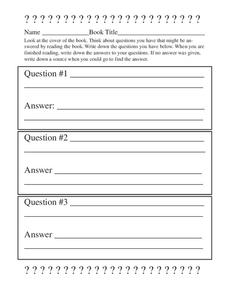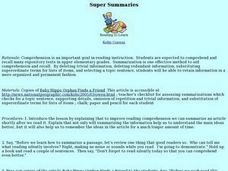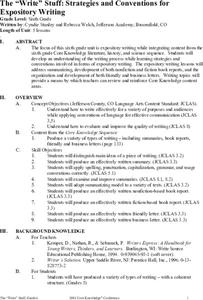Polk Bros Foundation
How to Summarize a Non-Fiction Passage
After reading a text, one way to find out how much your class comprehended is to ask your pupils to summarize. This worksheet helps class members prepare for writing a summary of a nonfiction text. They note down the topic, up to eight...
Polk Bros Foundation
Comprehensive Nonfiction Reading Questions
Analyze any nonfiction text with the set of questions on this sheet. Class members practice inferring by noting the main idea and purpose of a passage. They also analyze an opinion in the passage and write a brief summary. See the...
Syracuse City School District
Summary of Fiction and Non-Fiction Text
Somebody Wanted But So Then (SWBST)? Yes! Here's a great strategy for teaching young readers how to summarize narrative text. In addition, the packet includes exercises that show kids how to summarize nonfiction text using the classic...
Louisiana Department of Education
Out of the Dust
The Grapes of Wrath may be the most famous novel set during the Dust Bowl, but what other stories cover the same time? The unit focuses on the Karen Hesse novel Out of the Dust. Learners keep a timeline of the Dust Bowl, maintain a...
Prestwick House
Reading Nonfiction: Analyzing Joseph McCarthy's "Enemies from Within" Speech
Looking for a instructional activity that teaches class members how to analyze nonfiction? Use Joseph McCarthy's famous "Enemies from Within" speech as a instructional text. Worksheet questions direct readers' attention to the many...
EngageNY
Grade 11 ELA Module 1: Unit 3, Lesson 1
What was Shakespeare's youth like? Virginia Woolf considers the question in her nonfiction text, A Room of One's Own. Scholars begin reading Woolf's work before analyzing some of the text. Next, they write an objective summary and...
Curated OER
Super Summarizer!!!
Emerging readers summarize a nonfiction text using a five step process. After a brief demonstration of the five-step method for summarizing text, they read a nonfiction article and write their own summary. A checklist of each summary is...
Curated OER
Short and Sweet Science
Readers learn how to summarize scientific text and evaluate the advantages, disadvantages, and challenges in writing summaries. They select science-related articles you've pulled and collected from the New York Times and, with a partner,...
Curated OER
When I Set My Hat at a Certain Angle: Trying on Zora Neale Hurston's Voice to Dress-up Prose
After reading and evaluating examples of prose nonfiction by Zora Neale Hurston and other authors, high schoolers write a personal reflective essay rich in figurative language. By incorporating this strategy, they utilize voice within...
Curated OER
NonFiction Reading
Students explore reading nonfiction. In this nonfiction instructional activity, students practice using KWL charts to organize nonfiction information gained from reading. Students explore unfamiliar words from reading and recognize...
Curated OER
Main Idea in Informational Text
Individuals complete a pre-assessment to gauge their ability to determine the main idea and supporting details in nonfiction text. They examine a new piece of nonfiction reading by looking at the table of contents, headings, and index...
Curated OER
Reading Study Guide: I Know Why the Caged Bird Sings
Meant for use with Maya Angelou's first autobiographical volume I Know Why the Caged Bird Sings, the materials here are designed for a homeschool setting, but they'd suit any classroom or text. Graphic organizers, chapter summary guides,...
Curated OER
Researching the Past
Learners research the western movement in order to learn note taking strategies with nonfiction texts. They use the Internet to search for important information about the western movement using the Cornell Notes note-taking system. They...
Polk Bros Foundation
A Way to Analyze Paragraphs to Figure Out the Main Idea of a Nonfiction Text
Shrink up a section by asking pupils to write down the main idea for each of seven paragraphs. There is a space provided for each main idea. When students have completed this portion, they write down what they think to be the central...
Curated OER
Genre Lesson: Autobiography
Start kids thinking about point of view and autobiographies by telling them a short story about your morning (first person), and then asking a volunteer to re-tell the story to you (second person). There are tips to help you tie this...
Ideas From Suzi
Responding to Literature
Guide your class through a text with resources for before and after reading. Learners ask questions, discuss characters and plot points, point out elements of the reading that stood out, and compose brief summaries.
Curated OER
Express Yourself Lesson Seed 17: Obituary
The Cay has been criticized by groups such as the Council on Interracial Books for Children because of the way race is portrayed. Explore the argument against the book while taking the author's perspective into account. Class members...
Curriculum Corner
I See a School
Enthusiastic readers report on a book detailing what it's about and their favorite part with a picture-based writing template. A nonfiction version takes a step further to highlight what the pupil learned, and a fiction version showcases...
Curated OER
Super Summaries
Third graders summarize a piece of nonfiction text. After reviewing the correct way to read in order to summarize, 3rd graders independently read a nonfiction article. They write a summary paragraph using the questions outlined by the...
Curated OER
1, 2, 3...A Summary
Students summarize a piece of nonfiction text. After reviewing the correct way to gather the important information needed to summarize, students independently read a nonfiction article. They write a summary paragraph using the process...
Curated OER
The "Write" Stuff: Strategies and Conventions for Expository Writing
Students develop their expository writing skills while integrating various other subjects. In this writing skills lesson, students complete 4 multiple activity lessons to improve their expository writing skills.
Curated OER
K-W-L Chart
After choosing a topic of interest, young learners use the K-W-L thinking process to create an informational, illustrated, big book. K-W-L, a three-part thinking process, asks the learner to respond to three questions: What do we know...
Curated OER
The Purpose and Power of Persuasion
Examine the power of persuasion and have learners consider how it influences events in their own lives. After reading and analyzing informational texts to understand the author's purpose, class members take a written test and craft a...
Scholastic
Comprehension During Independent Reading
Ideal for a language arts class, literary unit, or independent reading assignment, a set of reading worksheets address a wide array of skills. From poetic elements to nonfiction text features, you can surely find a valuable resource in...






